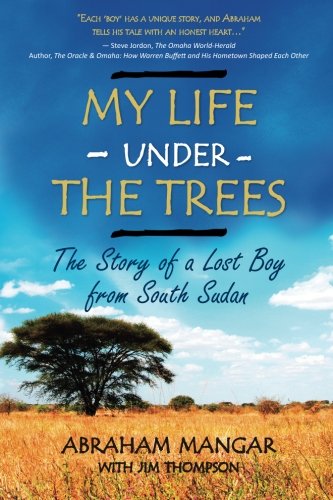Customer Services
Copyright © 2025 Desertcart Holdings Limited
Desert Online General Trading LLC
Dubai, United Arab Emirates




My Life Under the Trees: The Story of a Lost Boy from South Sudan
J**R
3.5 stars
I read this mainly because the author is a relative of some neighbor boys I taught in cub scouts.Abraham tells his memories of his childhood in Sudan (now South Sudan), which was involved in a long civil war. At age 6 he was taken from his home, along with the other boys in the area, by the SPLM/A. They walked for days and weeks, then faced disease and starvation, lack of shelter and clothing, and other hardships for years. The older boys eventually joined the army. The really sad thing is that they were better off leaving home than staying because of all the massacres going on. The fact that such young kids could endure all this is astounding. The most poverty-stricken Americans live like kings compared to these guys.The storytelling is pretty engaging overall. The chapters ended abruptly, which made the story feel like bits of disconnected information strung together rather than a cohesive whole. There some places with a lot of misspelled words and awkward grammar.
J**Y
Count your blessings
A friend of a friend wrote this book so that’s why I bought it. It’s a very moving story and a reminder of how lucky we are to live in the USA!
D**A
Great story someone always has it worse off then you.
Amazing book great story worth the buy!
C**Y
A story worth telling
I love South Sudan and was happy to hear a story of someone who has lived the history. Well written as a story.
S**E
Read history from it's first-hand report! A memoir no one should miss.
When a new country takes shape, is its history chronicled only by governments and intellectuals or as Howard Zinn so refreshingly reminded us, is history better told through the stories of people who experience that history? In this wonderful little book, Abraham Mangar invites the reader into the world of his childhood, a world shaped by competing political, religious and tribal forces, where young boys experience the consequences of that struggle. With poignant and detailed personal recollections, Abraham takes the reader into the days of his young life, where and we see what it is like to be on the receiving end of decisions made by others: decisions of parents, of leaders, of the UN, of other governments, of individuals trying to either help or take advantage of the situation. It is more than a trek across thousands of miles of African landscape and the struggle of 10's of thousands of young boys to live life 'under the trees'. It is the history of a country, told through the lives of some of it's youngest citizens. It is a story of human survival in extraordinary conditions. It is the story of us, a story of both human cruelty and graciousness, and in the end, Abraham finds a sense of purpose in it. Good read, especially once you settle into the style. I highly recommend.
M**G
highly recommended.
As a child, Abraham and other boys in the region were taken from their home in Sudan and forced to live away from their families. Subjected to manual labor while scrambling to find enough food, Abraham and the other boys suffered years of deprivation. As Abraham learns to survive, he is shuffled from place to place, often fleeing for his life.This was a fascinating glimpse into the life of one of the Lost Boys of Sudan. It was well written and engaging. I can see middle school or teenage children reading this book and relating to Abraham as a young boy. Overall, highly recommended.
N**I
An Incredible Journey
This was an excellent book. I read it in two days, and I plan to read it to my husband on our next road trip. Following are the reasons I enjoyed the book so much:1. Voice. As you read the book, it feels very much like it would if the story were being told in person. I LOVED this.2. Honesty. The book has a very honest feel to it. I can't really describe it, but it was refreshing. :)3. Information. I am unfamiliar with some of the people, places, and cultural issues discussed in the book, but the author had the good sense to prepare for an audience like me. :) A map in the back of the book shows the route he traveled, and short bios of prominent figures are scattered through the book. The author also takes the time to explain cultural practices to the reader. Photographs and diagrams also accompany the text.4. Cleanliness. The author tells a difficult story, but he does so without offending his reader. It is getting harder and harder to find books free from profanity and other garbage. How refreshing to read one that is! I really appreciate the author's respect for his reader. I cannot wait for my kids to read this book. They will learn so much, and I'm sooooo grateful that they can read it without learning a new vocabulary. :)
C**S
A Great story about survival.
I had a hard time putting this book down. As sad as this story was I enjoyed reading it, since I have heard many of these stories from others. What these young children went through was frightful, and the number of innocent children who didn't make it. God Bless the Lost Boys of Sudan! You are survivors!
Trustpilot
2 weeks ago
5 days ago